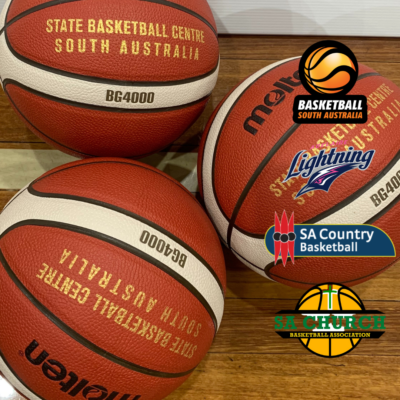A powerful case can be made for Geoff Weeks that would rank him as the No.1 referee ever produced in South Australia.
His record of achievement as one of the nation’s greatest referees is second-to-none in SA, his understanding and appreciation for what the players were experiencing and ability to officiate with a common-sense and supportive approach setting him apart from an early age.
He called his first women’s state league game in 1974 and first men’s match in 1976, en route to winning the Phil Yuill Trophy as SA Referee of the Year 23 times from 1978-2001.
During that period and beyond, Geoff officiated the State League Finals series for 27 years from 1978-2005.
Unquestionably the stand-out umpire in the state, when the NBL launched in 1979, he immediately was part of the officiating panel and called a whopping 697 games over 30 seasons. He officiated in 29 NBL Finals Series and handled three Grand Final series.
Twice Referee of the Year for the WNBL, he was part of the women’s league’s inaugural panel from 1981 and called 100 games and four Grand Finals.
Highly respected by players, coaches and fans alike due to his on-court efficiency, laid-back nature and ability to accurately read the play, Geoff set the standard to which young officials could aspire.
He remains an inspiration and a valuable resource to referees learning the craft of officiating. His encouragement to officials working their way up the ladder of success has been invaluable.
And why not?
He stands alone as Australia’s youngest FIBA licence-holder, which he held for 28 years from 1979. That was a mere year after attaining his Australian Referee’s Badge and by 1981, his international officiating journey was underway when he called the FIBA Oceania Under-20 Men’s Qualification Series.
He already was calling various international games with visiting foreign teams in Australia from 1979 but his talents saw him attending the 1983 FIBA World Junior Men’s Championship in Spain as Australia’s referee and two years later, he was the nation’s official at the FIBA World Junior Women’s Championship in the US.
In 1988, Geoff became an Olympian when he refereed at the Seoul Olympic Games, arguably the pinnacle of his international achievements.
Highly respected throughout Asia because he could not be influenced, financially or otherwise to tamper with games, Geoff officiated at the 1984 FIBA Asian Women’s Championship in Malaysia, the 1986 Men’s Crown Prince tournament in Thailand and was the gold medal match referee at the 1991 Malaysian Invitational tournament.
He officiated at the 1992 William Jones Tournament in Taiwan, the 1993 FIBA invitation Asian Junior Men’s Basketball Championship in Malaysia which included handling the gold medal playoff, the 1995 Invitation Malaysian Men’s Basketball League Finals Series where he again had the gold medal playoff as he did at the 1996 Invitation Indonesian Men’s Basketball League Finals Series.
Geoff’s prominence across Asia continued with his performance at the 1999 FIBA Invitation Asian Men’s Basketball Olympic Qualifications Championship in Japan again earning him the gold medal game.
His ability to ignore outside influences and never lose focus saw him ref the 2000 Invitation Chinese Basketball League All Star Game, line up as the gold medal game ref at the 2001 FIBA Invitation Asian Club Championship in Malaysia where he returned two years later for the Sarawak Men’s Invitational Tournament.
Of course Geoff wasn’t limited to Asia, calling the women’s gold medal playoff at the 1990 Goodwill Games in the US and officiating at the 2001 Men’s Goodwill Games in Brisbane.
Naturally Geoff also officiated at Australian States Junior Championships, from under-16s to Under-20s, his stellar career coming to an abrupt and premature end due to a severe ankle injury in 2008.
Two years later, FIBA awarded him its Retired International Licence which came on top of his 1989 Basketball Association of SA Life Membership, 2004 NBL Life Membership and seven years ago, Geoff became an inaugural member of the Basketball SA Platinum League.
Affable, popular and beyond reproach for his work as an outstanding referee in an era of great officials, Geoff Weeks’ induction into the 2021 Basketball SA Hall of Fame is fitting acknowledgement of a career brilliantly and meticulously performed and executed.
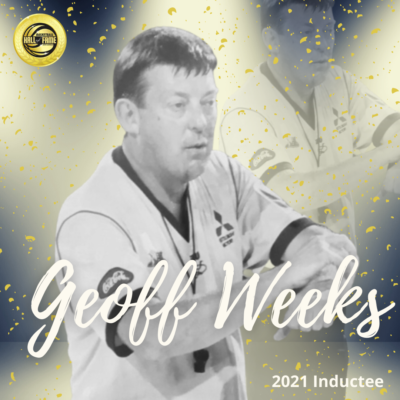
North Adelaide’s 1990 senior women’s team was one for the ages, arguably the greatest single-year club team in Basketball SA’s long and storied history.
From the outset, the Rockets looked the part, sweeping through the City of Adelaide Conference – the former “summer season” in SA – with a 10-0 record to capture the championship.
The Australian Club Championship annually brought together the nation’s 24 leading club teams to contest a four-day carnival that would determine our champion side, even though the WNBL now provided a weekly home/away competition to achieve the same result.
The ACC tournament staged in Melbourne, North Adelaide duly swept aside the best the nation had to offer, completing its journey to the championship with a 5-0 winning streak.
Playmaker Vicki Daldy was named MVP of the Grand Final and into the tournament All-Star Five after being named MVP of all five of North’s ACC matches.
Coach Mark Molitor was named the Coach of the Tournament.
By now, many were sensing these Rockets were bound to be a team of destiny. Molitor, recruited as an American import to play for North’s men’s team in the early 80s, had assembled an exceptional side that had strengths in every position.
In Hall of Famer Rachael Sporn, North recruited the best centre in the business, then retained dual-Olympian and Hall of Famer Marina Pearce (nee Moffa) and Opals forward Donna Brown to support her.
Murray Bridge’s young tyro Jo Hill and talented Eastern Hills forward/centre Melissa Day rounded out a richly-talented frontcourt, ably supported by a premium backcourt.
Daldy, who would continue on to coach Norwood to multiple state titles and also Adelaide Lightning to a WNBL championship, provided the team’s on-court leadership as its floor general.
Beside her were Michelle Weir, American import Jenny Brown, Vanessa Porritt and Jacqui Pearce – as formidable and deep a guard combination as could be found in the country.
And whenever “Sporny” and “Moff” were absent due to Opals national duties, former veteran WNBL forward Leeanne Grantham was one of the fill-ins used to maintain the numbers and depth of this awesome team.
Throughout the WNBL regular season, North looked capable of achieving what no South Australian club team had and in the 10th year of the league, the Rockets reigned supreme, beating the Kathy Foster-led Hobart 72-57 in the Grand Final, played in Hobart before a full house which steadily fell into greater and greater silence.
En route to claiming the crown, North Adelaide became the first non-Victorian team to do so, the first (and ultimately only) club team from SA to win a WNBL championship and finished the home/away season with a 22-2 win-loss record.
Along that journey, the Rockets set a league record by winning 21 consecutive games before giving the WNBL two members of its All-Star Five in Vicki Daldy and Donna Brown, while Brown also was named MVP of the Grand Final success.
Back in Adelaide for the main season – then known as the State Bank League – North thrashed fellow WNBL club Noarlunga City Tigers by 29 points in one semi final before routing West Adelaide 59-41 in the Grand Final to claim the SA Championship.
This time it was Sporn who claimed Grand Final MVP honours in a season where three of the state’s All-Star Five were from the Rockets, namely Sporn, Brown and Daldy.
It was the Rockets’ remarkable 12th consecutive State League Grand Final appearance since 1979, and gave them the “threepeat” with championships in 1988-1989-1990.
Donna Brown was voted by the referees as the 1990 Halls Medallist, the state’s fairest and most brilliant player, while Daldy was named the league’s MVP on the annual vote by her peers.
Brown also was awarded as the state’s Best Defensive Player, Molitor named Coach of the Year for his second year in succession and in all, North Adelaide drove through 1990 winning 56 games and dropping just six.
Molitor’s coaching assistant, Jan Stirling, went on to further great success as a four-time WNBL championship coach of the Adelaide Lightning and steered the Australian Opals to a FIBA World Championship Gold Medal in 2006.
As a team of destiny and one of total domination, North Adelaide Rockets of 1990 remain incomparable, also winning the McAvaney Award as the “best club team” at the 25th SA Women’s Sports Association awards.
| Year | Event (including location) | North Adelaide Result |
| 1990 | City of Adelaide Conference Champions – Adelaide | (W-L: 10-0) |
| 1990 | 1990 Australian Women’s Club Champions – Melbourne | (W-L: 5-0) |
| 1990 | Women’s National Basketball League Champions – Hobart | (W-L: 24-3) |
| 1990 | 1990 State Bank League Champions – Adelaide | (W-L: 17-3) |
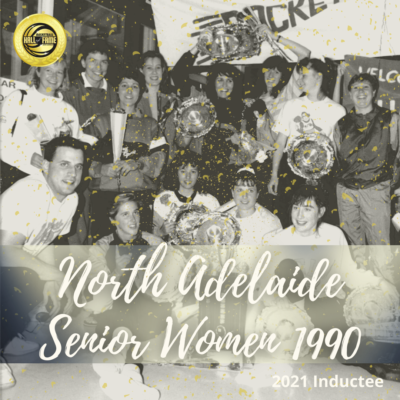
Ted Powell’s basketball legacy in South Australia is an amazing story that covers everything from venue management, to junior coaching, to senior coaching and to being the driving force behind what now is the burgeoning competition known nationwide as the Women’s National Basketball League.
It truly takes in an extremely broad range of basketball-related activities but undoubtedly his greatest single achievement was the inauguration and launch of the WNBL, a challenge he took on after coaching West Adelaide’s women’s team to the 1980 SA Championship.
Powell inherited the Bearcats’ senior women’s team from Terry Aston and took his beloved Bearcats to SA championships in 1980-83-87 and also into the 1985 WNBL Final and Australian Club Championship Final that same year.
The men’s NBL launched in 1979 and Powell, always a strident equal opportunity advocate, decided it was time a genuine effort was made to establish regular interstate competition between women’s club teams as well.
Until then, the only arena for interstate club interaction was either the Australian Club Championship – an annual four-day tournament featuring the 24 best clubs from around the nation, with the host venue rotating between Sydney, Melbourne and Adelaide – or various popular minor tournaments such as the Warrnambool Seaside Classic around Australia Day, or Swan Hill’s annual New Year’s carnival.
The Australian States Championship, a weeklong carnival contested annually between senior state teams, also still was in operation. The problem with this competition was it only catered for the 10 selected elite players of each state.
“We were looking to raise the level of club competition by regularly playing against the best from interstate,” Powell said years later when recalling how it all began. All that existed at the time were repetitive and one-dimensional state leagues.
Powell sounded out fellow South Australian coaches Kay McFarlane of North Adelaide Rockets and Brendan Flynn of Noarlunga City Tigers about a concept involving the three SA teams and three leading Victorian clubs, St Kilda, CYMS and Telstars competing in a regular interstate competition.
The initial name for what would become the WNBL was the Southern Conference Big Six, Powell also engaging St Kilda women’s coach Bill Palmer in the ongoing dialogue.
Buoyed by his support, Powell immediately contacted McFarlane and Flynn to arrange a lunch meeting at the Governor Hindmarsh Hotel in Adelaide to discuss the next steps.
By the time the 1980 Australian Club Championship in October in Sydney came around, NSW teams Sutherland and Canterbury-Bankstown were also invited.
In Warrnambool on Sunday, January 25, 1981, the eight-team competition was ready for its June launch as the “Women’s Interstate Basketball Conference.” The Australian Institute of Sport had the funding to also jump aboard and did just that, the league launching on Friday, June 19, 1981 when the AIS played in Adelaide.
Powell’s vision and more, his determined intent to make it happen, had created a league and it now was underway.
He coached West Adelaide Bearcats’ WNBL team from 1981-1991 and made sure his club conducted itself in the most professional possible manner.
Team photos, publicity, stats – Powell drove it all and on out to the general news media, when he wasn’t out chasing sponsorships or coaching his ball club. He was committed and fulltime in every sense.
On court his Bearcats were WNBL semi finalists in 1981-82 and a grand finalist in 1984.
Powell loved and respected the burgeoning new league, whether West was at Bowden, then Athol Park or Apollo Stadium and he again drove pre-game meals for sponsors, media and friends, and post-game functions for all of the above, plus the players.
He was ahead of his time.
But not only is he credited with tipping off the sport’s most important women’s league and thereby building the game at the top end, he also was responsible in 1976 for bringing mini-ball to South Australia, revealing and reinforcing his passion for the sport at the grassroots level.
Powell also “discovered” one of South Australian basketball’s greatest ever players, Hall of Famer Rachael Sporn, brought some of the first quality American imports – such as Rhonda Corkeron (nee Bates) – into the sport and played a major role in the careers of local standouts such as dual-Halls Medallist Cass Pujals (nee Dalton).
Crossing to West Adelaide from Sturt to take up managing the club’s Bowden Stadium headquarters, Powell first was a distinguished junior girls coach.
He coached West’s under-16 girls to the National Classic title in 1980 and was South Australia’s under-16 state coach in 1976-77-78, winning the national championship in 1977.
He held the role of under-18 SA state coach in 1971-79-80-81 and was West Adelaide Junior Coaching Director from 1977 to 1992.
A two-time State senior coach, Basketball Association of SA Coach of the Year in 1987, a WNBL Award of Merit in 1995, a WNBL Executive Member from 1980 to 1984, Powell was awarded WNBL Life Membership in 2001.
In 2013 when West Adelaide Bearcats Basketball Club inaugurated its Hall of Fame, Powell was an automatic inductee and immediately afforded “Legend” status, the highest honour the club could award.
He continued to coach at senior (now NBL1 Central) level in South Australia after his tenure at West ended, successfully steering Central District Lions into a preliminary final and turning Murray Bridge Bullets into a competitive force.
He won a further Coach of the Year accolade along that journey.
Powell passed away in 2019 at 75 but his is a lasting legacy to the sport in Australia and as an inductee into the Basketball SA Hall of Fame, he is long overdue.
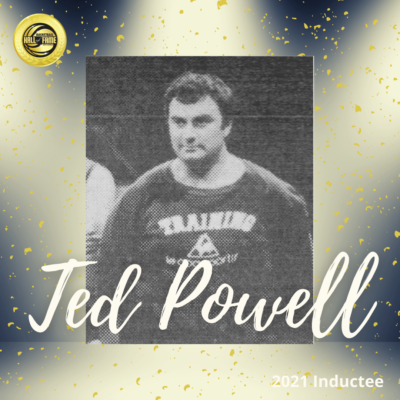
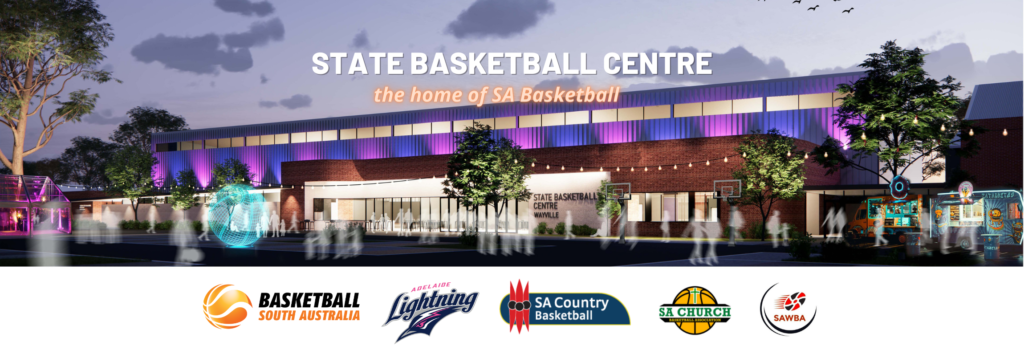
South Australia will soon have a new ‘home for basketball’ thanks to a $15 million investment by the Marshall Liberal Government.
The new centre will become the headquarters for the Adelaide Lightning, Basketball SA, SA Country Basketball, SA Church Basketball and SA Wheelchair Basketball.
The State Basketball Centre will be built as an extension to the Wayville Sports Centre, creating 64 jobs through construction, and provide four additional courts including a show court capable of hosting 1,600 people for events.
The new facility will cater for community through to high-performance basketball and see local, district, state and national league teams all training from the same venue.
Minister for Recreation, Sport and Racing, Corey Wingard, said the project is another big win for the state as the Marshall Liberal Government continues to position South Australia as a national and world leader in sport and recreation.
“Over this past year we’ve committed to major infrastructure upgrades which will benefit tennis, soccer, netball, cycling, athletics and lacrosse and it’s fantastic to be able to add basketball to this extensive list,” Minister Wingard said.
“Our State Sport and Recreation Infrastructure Plan recognised the need for an alternative ‘home’ for community basketball and the Adelaide Lightning; specifying a smaller, high-quality boutique show court would be a more appealing prospect for players, spectators and television viewers.
“The additional four courts in the State Basketball Centre will take the Wayville venue to seven courts overall, which will alleviate pressure on local suburban and country basketball courts, meaning more kids will have the opportunity to play basketball and be active.”
Basketball SA CEO Phil Sinnott said the announcement of the development marks a momentous occasion for basketball in South Australia.
“The State Basketball Centre is an important facility for grassroots, community, high-performance and elite level basketball, supporting Basketball SA in its overall facilities development and upgrade strategy,” Mr Sinnott said.
“The development will allow us to expand local and country tournaments, carnivals and high-performance programs.
“We are also excited to have the ability to host national championships and showcase this facility to the rest of Australia.”
The Wayville location was selected for its proximity to the CBD, existing site services and infrastructure, public transport and the newly developed Adelaide Showground caravan park accommodation.
The facility will also provide wider community benefits through collaboration with the Royal Agricultural and Horticultural Society of SA, who will use the State Basketball Centre during the Royal Adelaide Show each year as they currently do with the Wayville Sports Centre.
The Wayville Sports Centre at the Adelaide Showground is situated on land owned by the Minister for the Department for Environment and Water.
The Adelaide Showground is assigned under a long-term lease to the Royal Agricultural and Horticultural Society of SA, who lease the Wayville Sports Centre to Basketball SA to manage the facility.
Construction of the facility is anticipated to commence following the completion of the Royal Adelaide Show in 2021.
